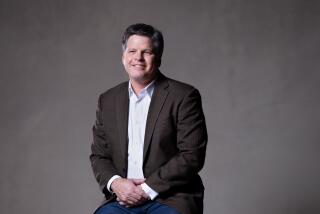In the Giving Spirit of the First Thanksgiving : Food Bank Provides Nutritional Support for Financially Strapped AIDS Patients
Alfia Hollywood began giving out food to AIDS sufferers almost four years ago, shortly after her son Ken was diagnosed as having the disease. That was Los Angelesâ first food giveaway program for AIDS sufferers--a humble, grass-roots operation that was sometimes victimized by fraud.
âPeople would come in and say, âMy friendâs sick and needs food,â â said Sergio Rebolledo, who sometimes used the service. âThen it would turn out that the people they said were their friends were already dead.â
Rebolledo, 32, now uses a plastic identification card to get his groceries at a spacious food bank in a nondescript building at 3329 Sunset Boulevard, formally unveiled Thanksgiving Day by the organizers of AIDS Project Los Angeles, the community support group for those stricken by the epidemic. In a brief ceremony conducted in English and Spanish, AIDS Project officials appealed for donations of food and money for what they call the Necessities of Life Program.
But for every silver lining, there is a cloud. In many ways, the size and sophistication of the AIDS Project food center represents the growth of the epidemic that long ago outpaced the Hollywoodsâ efforts. With a paid staff of two and 70 volunteers, the AIDS Project food center has already served 380 clients since opening its doors Nov. 1. It is expected to serve more than 1,000 people next year.
Because poverty often follows a diagnosis of AIDS or AIDS-related complex, the free food program is a boon for sufferers. Often too sick to work, the victims of acquired immune deficiency syndrome must rely on savings and welfare assistance to make ends meet.
âA lot of these people are trying to live on incomes of $280 to $550 per month,â said Jamie Henderson, director of the Necessities of Life Program. âAnd because of their condition, they need so much more. Some are spending $55 to $100 just on vitamin supplements.â
Although he has witnessed friends die and has been in and out the hospital three times this year, Rebolledo found reason to give thanks. For one thing, he had just started taking azidothymidine, the experimental drug that has shown promise in extending the lives of AIDS sufferers. For another thing, there was food stacked on a 35-foot-long ceremonial banquet table.
âThis really helps a lot,â said Rebolledo, who is both a client and a volunteer. âAll the volunteers and the staff, theyâve really been good to all of us.â
To qualify for the free food, people must have an AIDS or AIDS-related complex diagnosis, be a resident of California and have an income of less than $845 a month. When they register as an AIDS Project client, they are issued a numbered plastic identification card, similar to a credit card, that allows them to use the food bank and other services. The numbered I.D. card provides a safeguard against people fraudulently seeking free food.
AIDS Project has enlisted some pharmacists, dry cleaners, video store owners and other merchants to give 10% to 20% discounts to people who have the I.D. card.
Wary that clients could be subject to discrimination, the I.D. card does not mention AIDS or AIDS Project, but rather bears the design of the groupâs annual Commitment to Life Award, presented first to Betty Ford and most recently to Elizabeth Taylor.
AIDS Project Executive Director Paula Van Ness credited the Hollywoods for realizing that âmany people with AIDS were not following a good diet or were too weak to stand in line for food stamps.â They took donations of food and raised money with garage sales. Storage space for the Hollywoodsâ effort, Van Ness recalled, âwas about the size of a closet.â Much of AIDS Projectsâ funding, by contrast, comes from the government sources.
Ken Hollywood died this September. Alfia Hollywood, reached at her home Thursday, said though that it was true their efforts were sometimes victimized by fraud, âIâd get wise. It didnât happen a second time.â She has pressed on with her efforts since her sonâs death. On Thursday she visited hospitals to deliver food baskets to bed-ridden AIDS patients.
âStretch the Dollarâ
Van Ness said the Necessities of Life Program âreally helps us stretch the dollar.â Last year, AIDS Project, which receives county funding and private contributions, gave $50,000 worth of food certificates for major grocers, who provided some discount. But now the new food center stacks its shelves with federal surplus staples such as flour, powdered milk, cheese and rice. It also takes community contributions and pools funds with other nonprofit agencies in the Emergency Food Council Food Buying Co-op to buy fresh produce and food at bulk wholesale rates. A delivery service is also provided.
Henderson asked for community help in increasing the inventory of foodstuffs and hygiene items that are expensive and harder to come by. The daily diet of AIDS sufferers who have experienced pneumonia includes high-caloric, high-vitamin nutritional supplements. But one case costs $24.
The list of food items sought through donation includes tuna, bottled juices, peanut butter, breakfast cereal, canned fruit, chunky soups, ketchup, mayonnaise, macaroni and cheese, beef stew, tomato sauce, coffee and tea. Non-food items sought include vitamins, toothpaste, liquid disinfectant, shampoo, laundry soap, dish detergent, aluminum foil, deodorant, disposable razors and toilet paper.
More to Read
Sign up for Essential California
The most important California stories and recommendations in your inbox every morning.
You may occasionally receive promotional content from the Los Angeles Times.










